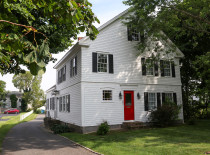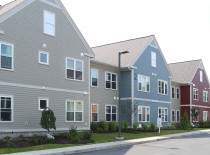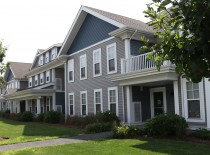Category: Housing
The Cape Cod Commission is developing program frameworks to preserve and expand year-round housing opportunities. This work, undertaken in partnership with Outwith Studio, builds on recommendations outlined in the Cape Cod Regional Housing Strategy and aims to identify practical, effective ways to incentivize and support year-round residents.
A framework for establishing a Cape Cod Housing Trust and Housing Land Bank is complete. Created in collaboration with consultants Outwith Studio and Utile along with land bank consultants out of Ohio, the framework provides recommendations and next steps for potentially establishing the entity(ies) based on feedback received from stakeholders at numerous meetings throughout the fall and early winter. The framework emphasizes sustainable development and the importance of community engagement in ultimately bringing the entities to life.
Each year, the Cape Cod Commission receives funding through the Massachusetts Executive Office of Housing and Living Communities to provide technical assistance to towns in our region. The District Local Technical Assistance (DLTA) program helps municipalities with sustainable development and encourages partnerships to achieve planning and development goals that align with state and regional priorities.
Over the years, DLTA funds have supported housing and wastewater initiatives, studies of redevelopment options and economic development strategies, and targeted local planning and zoning efforts. Four projects received 2025 DLTA funds.
The Seasonal Communities designation recognizes Massachusetts communities with substantial seasonal variations in housing demand, visitor populations, and employment. The designation provides distinctive tools to address these unique housing needs. The law also created the Seasonal Communities Advisory Council to provide expertise on issues related to municipal government, the hospitality and tourism industries, housing law, and housing development and finance. The Council offers advice and recommendations on policies and programs tailored to the needs of seasonal communities. The Advisory Council held its first meeting earlier this month.
As stated in the Regional Housing Strategy, Cape Cod needs bold and swift action to address the housing crisis. Completed in May 2024, the strategy provides recommendations for addressing the region's housing supply, affordability, and availability challenges.
One of the key regional recommendations is establishing a housing land bank and a community land trust. These two potential entities could work together to facilitate swifter acquisition, stewardship, development, and redevelopment of properties to advance attainable and affordable housing.
During the development of the Regional Housing Strategy, stakeholders expressed the need to simplify the permitting process, where possible. In response, the Strategy includes recommendations to make permitting for housing development and redevelopment more predictable and streamlined, especially in locally- and regionally-identified suitable locations. One strategy is the creation of a catalog of model housing plans for small-scale housing types, which could be pre-approved or pre-reviewed at the local level—creating a more predictable process that saves both time and money for developers and reflects the priorities of a community as it relates to housing type and design.
Diverse housing options are needed to ease the region’s housing crisis, but securing a permit for new multifamily home construction on Cape Cod can be difficult and lengthy. The Commission is working with a consulting team of Flintlock LAB, Union Studio Architecture and Design, and Kronberg Urbanists and Architects to develop plans for a variety of compact and small-scale housing types, such as detached accessory dwelling units or cottages, duplexes, townhouses, triplexes, and small multifamily buildings.
With 86 percent of Cape Cod's land already either developed or protected, acquiring available land for affordable housing development or redevelopment can be difficult and slow. During the development of the Regional Housing Strategy, the Cape Cod Commission heard this concern from many towns and other stakeholders across the region.
In response, the key recommendations outlined in the Regional Housing Strategy include establishing a regional housing land bank and a community land trust that will work together to acquire and facilitate the development of affordable housing on Cape Cod.
The Cape Cod Commission is pleased to release Housing Cape Cod: The Regional Strategy. This comprehensive document identifies policies and strategies for appropriate housing development and redevelopment to address housing supply, affordability, and availability challenges while protecting the region’s sensitive resources.
Each year, the Cape Cod Commission receives funding through the Massachusetts Executive Office of Housing and Living Communities (previously the Department of Housing and Community Development) to provide technical assistance to towns in our region. The District Local Technical Assistance (DLTA) program helps municipalities with sustainable development and encourages partnerships to achieve planning and development goals that align with state and regional priorities.









